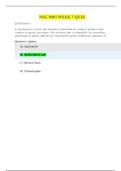Nursing nsg 5003 - Study guides, Class notes & Summaries
Looking for the best study guides, study notes and summaries about Nursing nsg 5003? On this page you'll find 107 study documents about Nursing nsg 5003.
Page 4 out of 107 results
Sort by
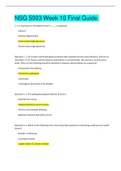
-
NSG 5003 Week 10 Final Guide.
- Exam (elaborations) • 53 pages • 2022
-
- $12.99
- + learn more
NSG 5003 Week 10 Final Guide. 1. It is important to not dilate the eye if ____ is suspected. Cataract Macular degeneration Acute closed-angle glaucoma Chronic open-angle glaucoma Question 2. 2. An 18-year-old female patient presents with repeated urinary tract infections. She has no risk factors in her history, and her physical examination is unremarkable. She also has a normal pelvic exam. Which of the following should be obtained if anatomic abnormalities are suspected? Ultrasound of ...
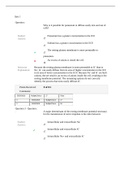
-
NSG 5003 pharmacology complete question and answers with well solved questions(100% SATSFACTORY COMPLETE PHARMACOLOGY EXAM)
- Package deal • 9 items • 2021
-
- $26.49
- + learn more
NSG 5003 pharmacology complete question and answers with well solved questions NSG 5003 Pharmacology Discussion Week 9 Part 2 complete NSG 5003 Knowledge Check 10 questions and answers with complete solution with well updated questions NURSING NSG5003 WEEK 6 MID-TERM QUESTIONS AND ANSWERS WITH COMPLETE SOLUTIONS RATED A+NSG 5003WEEK 5 QUESTIONS
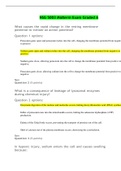
-
NSG 5003 Midterm Exam Graded A
- Exam (elaborations) • 18 pages • 2022
-
- $11.00
- + learn more
What causes the rapid change in the resting membrane potential to initiate an action potential? Question 1 options: Potassium gates open and potassium rushes into the cell, changing the membrane potential from negative to positive Sodium gates open and sodium rushes into the cell, changing the membrane potential from negative to positive. Sodium gates close, allowing potassium into the cell to change the membrane potential from positive to negative. Potassium gates close, allowing sod...
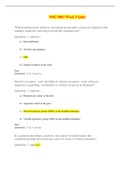
-
NSG 5003 Week 5 Quiz (VERIFIED)
- Exam (elaborations) • 9 pages • 2021
-
- $9.49
- + learn more
1. Which pulmonary defense mechanism propels a mucous blanket that entraps particles moving toward the oropharynx? 2. Stretch receptors and peripheral chemoreceptors send afferent impulses regarding ventilation to which location in the brain? 3. If a patient develops acidosis, the nurse would expect the oxyhemoglobin dissociation curve to react in which manner? 4. How is most carbon dioxide (CO2) in the blood transported? 5. The sternocleidomastoid and scalene muscles are referred to...
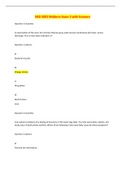
-
NSG 5003 Midterm Exam 3 with Answers (100% CORRECT)
- Exam (elaborations) • 69 pages • 2021
-
- $15.49
- + learn more
1. In examination of the nose, the clinician observes gray, pale mucous membranes with clear, serous discharge. This is most likely indicative of 2. Your patient complains of a feeling of heaviness in the lower legs daily. You note varicosities, edema, and dusky color of both ankles and feet. Which of the following is the most likely cause for these symptoms? 3. Which of the following is the most important question to ask during cardiovascular health history? 4. Rheumatic heart disease ...
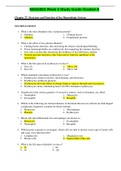
-
NSG5003 Week 6 Study Guide Graded A
- Exam (elaborations) • 15 pages • 2022
-
- $11.00
- + learn more
1. What is the most abundant class of plasma protein? a. Globulin c. Clotting factors b. Albumin d. Complement proteins 2. What is the effect of low plasma albumin? a. Clotting factors decrease, thus increasing the chance of prolonged bleeding. b. Fewer immunoglobulins are synthesized, thus impairing the immune function. c. Less iron is stored, thus increasing the incidence of iron deficiency anemia. d. Osmotic pressure decreases, thus water moves from the capillaries to the interstitiu...

-
NSG 5003 Week 9 Quiz - Question and Answers (VERIFIED)
- Exam (elaborations) • 7 pages • 2021
-
- $7.49
- + learn more
1. Cheyne-Stokes respirations are described as a: 2. Vomiting is associated with central nervous system (CNS) injuries that compress which of the brain’s anatomic locations? 3. Status epilepticus is considered a medical emergency because of the: 4. A sudden, explosive, disorderly discharge of cerebral neurons is termed: 5. A complex partial seizure is described as: 6. What type of seizure starts in the fingers and progressively spreads up the arm and extends to the leg? 7. Mu...
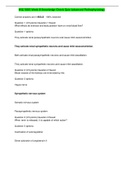
-
NSG 5003 Week 8 Knowledge Check Quiz Advanced Pathophysiology
- Exam (elaborations) • 8 pages • 2022
-
- $11.00
- + learn more
Question 1 (0.5 points) Question 1 Saved What effects do exercise and body position have on renal blood flow? Question 1 options: They activate renal parasympathetic neurons and cause mild vasoconstriction. They activate renal sympathetic neurons and cause mild vasoconstriction. Both activate renal parasympathetic neurons and cause mild vasodilation. They activate renal sympathetic neurons and cause mild vasodilation. Question 2 (0.5 points) Question 2 Saved Blood vessels of the ...
NSG 5003 WEEK 7 QUIZ / NSG5003 WEEK 7 QUIZ: GRADED A | 100% CORRECT |SOUTH UNIVERSITY
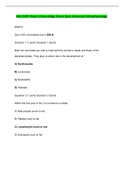
-
NSG 5003 Week 6 Knowledge Check Quiz Advanced Pathophysiology
- Exam (elaborations) • 4 pages • 2022
-
- $11.00
- + learn more
Question 1 (1 point) Question 1 Saved Both iron and folate are vital to meet both the woman’s needs and those of the developing baby. They play an active role in the development of: A) Erythrocytes B) Leukocytes C) Neutrophils D) Platelets Question 2 (1 point) Question 2 Saved Within the first year of life, it is normal for a childs: A) Reticulocyte count to rise B) Platelet count to fall C) Lymphocyte count to rise D) Eosinophil count to fall Question 3 (1 p...

Did you know that on average a seller on Stuvia earns $82 per month selling study resources? Hmm, hint, hint. Discover all about earning on Stuvia



